WATCH–A look at the ATP rankings this week:
American Reilly Opelka stands tall going into the 2019 season
By Steve Flink Oct 03, 2018Ranking Reaction
How Jessica Pegula and Coco Gauff can pass Iga Swiatek for the No. 2 ranking in Madrid
By John Berkok Apr 25, 2025Pick of the Day
Madrid Open Betting Preview: Joao Fonseca vs. Tommy Paul
By Zachary Cohen Apr 25, 2025Lifestyle
Iga Swiatek shares first look at new Lancôme campaign
By Baseline Staff Apr 25, 2025Madrid, Spain
"It’s being a complicated injury": Paula Badosa forced to delay 2025 clay debut with back issue
By TENNIS.com Apr 25, 2025Madrid, Spain
Reigning Madrid champ Andrey Rublev gets walkover from Gael Monfils; 2024 finalist Auger-Aliassime out
By TENNIS.com Apr 25, 2025Madrid, Spain
Diana Shnaider vs. Anastasija Sevastova: Where to Watch, Madrid Preview, Betting Odds
By TENNIS.com Apr 25, 2025Madrid, Spain
Novak Djokovic vs. Matteo Arnaldi: Where to Watch, Madrid Preview, Betting Odds
By TENNIS.com Apr 25, 2025Madrid, Spain
Joao Fonseca vs. Tommy Paul: Where to Watch, Madrid Preview, Betting Odds
By TENNIS.com Apr 25, 2025Social
Jannik Sinner on his comeback: “It won’t be easy”
By Emma Storey Apr 25, 2025American Reilly Opelka stands tall going into the 2019 season
Published Oct 03, 2018
Advertising
During an interview last week with an American standout tennis player named Reilly Opelka, I asked the towering 21-year-old to clarify his height. Is he 6’11”, as he is officially classified on the ATP World Tour website? Could he be taller than that? Enquiring minds would like to know.
The genial Opelka responds, “I am closer to 7'0" than to 6'11."
Renowned American coach Tom Gullikson—instrumental in shaping Opelka’s game from the age of seven or eight—has this to say on the subject:
“He probably is 7'0", so let’s just call it what it is. Maybe Reilly is the first seven-footer in the history of tennis. It is pretty much fundamental that the taller you are, the higher your center of gravity is. Tennis is such a fast-twitched sport with so many changes of direction. The challenge for Reilly is having the ability to stop and start and change direction constantly. Reilly moves really well for his size. He can do just about anything on a tennis court.”
Opelka has done quite a bit already. He currently is ranked No. 129 in the world, close to his career best status of No. 125. Residing in that territory is all the remarkable in light of the fact that his 2018 season was sorely disrupted by a bout with mono. He had won an ATP Challenger in Bordeaux before losing in the second round of the French Open qualifying. Returning home to Florida, he was thoroughly depleted.
“I started practicing with my coach, Jay Berger, on grass courts," Opelka said. "But 20 minutes into practice, I just could not go anymore. It was so frustrating. I went over to England and played in the Wimbledon qualifying. Something was really wrong. I won my first round match which was not that physical, but I was cramping by the end of the match. The next day my body didn’t feel good at all. I lost in the second round, came home, and talked to my doctor.”
Opelka’s mono was not fully diagnosed until after he competed in an ATP Challenger at Winnetka, Ill. later in July, losing in the first round with no energy.
“I had heard horror stories about mono," Opelka said. "A lot of players have had it, like Denis Kudla, John Isner and even Roger Federer. So I was lucky because we caught it early. I pretty much stayed inside all day for five weeks and rested because heat stress is really bad when you have mono.”
He still is nowhere near full physical capacity. During the second week of the US Open, Opelka was in Chicago, reaching the final of an ATP Challenger with victories (among others) over Michael Mmoh and Donald Young. A week later, he upended Ernesto Escobedo and Young on his way to the final of another ATP Challenger in Cary, N.C.
Those stellar showings demonstrated that Opelka was reestablishing physical strength and performing with the force and persuasion he has exhibited over the years, including winning the junior Wimbledon title in 2015, reaching the semifinals of Atlanta in 2016, taking out David Goffin to five sets in the opening round of the 2017 Australian Open, and ruling in Bordeaux this past spring.
Advertising
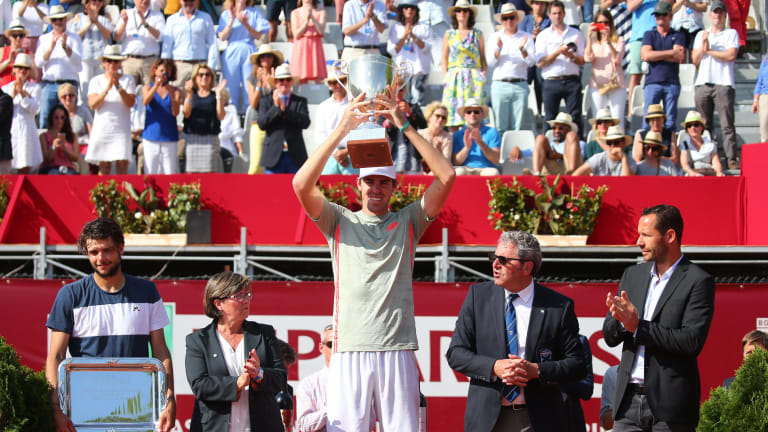
American Reilly Opelka stands tall going into the 2019 season
(Photo courtesy of ATP World Tour)
Looking at his recent resurgence at the ATP Challengers in September, Opelka says, "It was great for me and just a good test for my body. Playing two back to back finals is not easy. I wasn’t in ideal shape. The biggest positive that came out of those two weeks was playing ten matches and then coming home with my back feeling fine and having no nicks."
When Opelka has been in the right mindset, his powerhouse game has flourished. He readily recollects his junior Wimbledon triumph three years ago at the All England Club, and his win there over current world No. 38 Alex de Minaur.
"I played him first round and was down match point," Opelka said. "I was serving and we had a 20 ball rally. I was running side to side. He missed a forehand long down-the-line by about three inches that probably would have been a winner. I won like 15-13 in the third. I remember thinking, 'This guy is super crafty.' It does not surprise me at all that he is where he is at today."
That was Opelka’s toughest match of the Slam in terms of the scoreline, but his semifinal win over countryman Taylor Fritz lingers in his mind for high quality. “I don’t think you see too many juniors playing like we did that day. We could have been a threat to players at the next level.”
Advertising
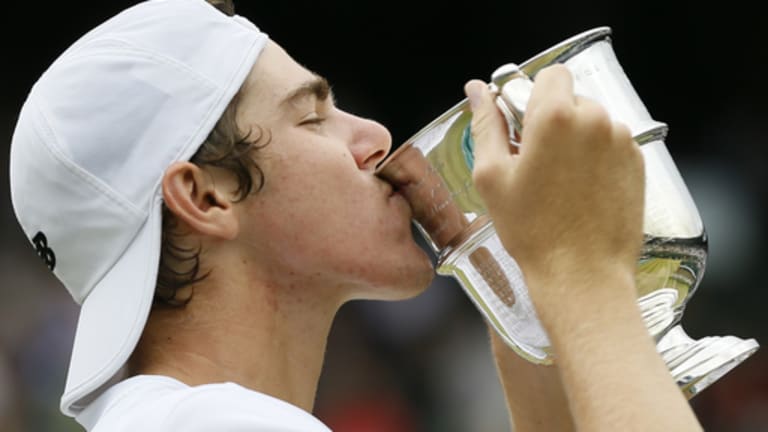
American Reilly Opelka stands tall going into the 2019 season
© AP
Shifting his attention to his journey to penultimate round in Atlanta two years ago—which included a win over Kevin Anderson—and his impressive showing against Goffin the following January in Australia, Opelka says, “Winning those matches at the ATP Tour level was huge. It proved I can play with guys that are top 20 in the world. And then to go to Australia and my first time in a Grand Slam, to qualify and then almost beat a guy ranked No. 11 in the world in a five set match, that showed my level is high.”
Opelka freely admits he was “very disappointed with the rest of 2017”, but he commenced his crucial partnership with coach Berger at the end of that season.
“He has put a lot of clarity in me," Opelka said. "That is what a good coach does. I moved out of Orlando at the end of November to West Palm Beach and started training with Jay in December. One day before we started training, we watched a lot of my matches and went over concepts regarding how I should play and certain balls I wasn’t going for. Jay was stressing that I should play with high risk because I hold serve about 90 percent of the time."
Advertising
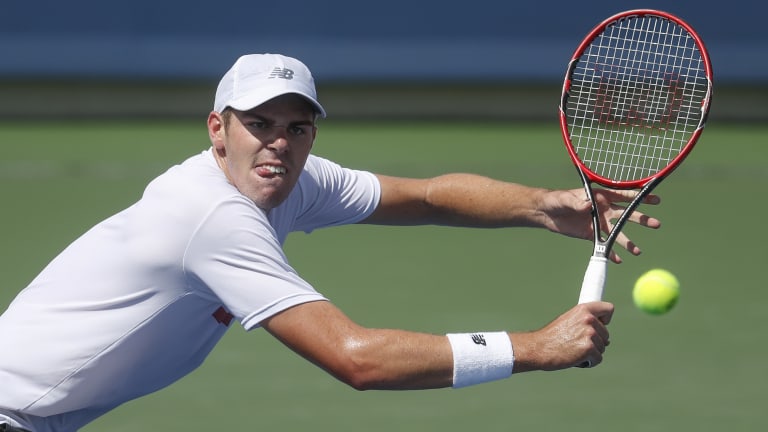
American Reilly Opelka stands tall going into the 2019 season
© AP
Gullikson, meanwhile, stays closely attuned to Opelka’s situation as a close friend and advisor. Ironically, he was briefly Berger’s coach back in the day.
"Tom was pretty much the guy who put a racket in my hand," Opelka said. "My fundamentals come from him. I have been so fortunate to be around some of the best minds in tennis from a young age. Gully is unbelievable. He taught me everything."
The mutual respect between Gullikson and Opelka stretches far and wide, across the bulk of Opelka’s lifetime, though every stage of the young man’s career.
"Reilly is in a really good place right now,” Gullikson said. “He has got a very good team around him. His game is going in a good direction, a little more toward the aggressive side, a little more coming in and using his height and athletic ability. He is also working on the mental side of the game with a good friend of mine who is a highly regarded sports psychologist. He has it all with Jay as his master coach and J.Y. Aubone as his traveling coach. Reilly has a big upside.”
Part of that upside can be attributed to Opelka’s circle of friends and those who have inspired him, including Isner. Opelka also deeply values his camaraderie with fellow Americans in his age bracket.
“There is a lot of camaraderie,” he said. “Mmoh is one of my best friends as are Tommy Paul, Fritz and Frances Tiafoe. I couldn’t speak more highly of Mmoh, who is just an unbelievable guy. All of us have been good friends since we were 12. We play fantasy football and pretty much talk every day.”
In the case of Isner, Opelka clearly relates to a man who is the same height he is, or perhaps half an inch shorter. Either way, Opelka speaks unabashedly about the 33-year-old.
“I know John well,” he said, “And grew up respecting him as a young kid. I loved watching him fight and find ways to win matches. He has helped me out sometimes with scouting reports on guys I am playing. Everyone tries to coach from afar and they say you have to play proper ‘Big Man’ tennis. I have heard that so many times from so many people, but John gets it that it is almost better for me to learn and figure things out on my own.
"The biggest lesson I have learned from him is just how tough he is mentally. He has a really good sense of how much of a nightmare he is for others to face."
Advertising
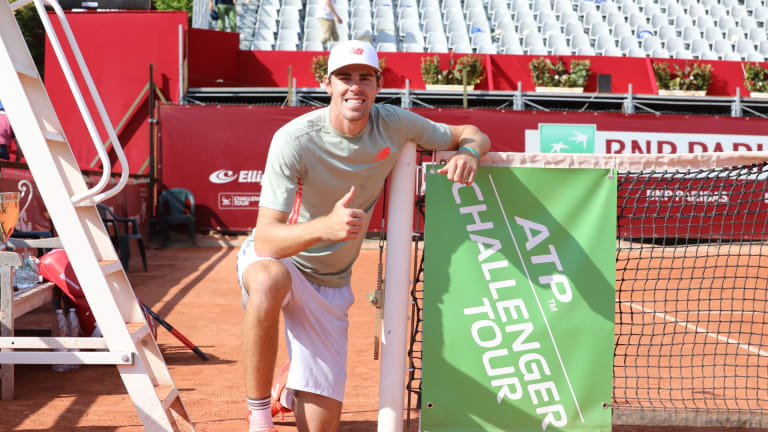
American Reilly Opelka stands tall going into the 2019 season
(Photo courtesy of ATP World Tour)
Does Opelka want to be viewed by his colleagues on the ATP tour the same way?
"Yes. Ideally that is what I want my reputation to be," he said. "I want the scouting report on me to be,'This guy is a nightmare to play.’ But I also know that you have to be really good everywhere on the court the way tennis is going now. That is why I have been working with Jay so much on my backhand to get more topspin and safety on the ball. That has helped a ton. I am spending 30 to 40 minutes a day just on the return of serve. My dream is to win a Grand Slam so I need to do all of these things."
There will always be bumps on the road to progress for Opelka, as is the case for everyone with large dreams and lofty aspirations. On Tuesday, despite 32 aces in 14 service games, he was beaten 6-7 (4), 6-4, 6-4 in the opening round of the ATP Challenger in Stockton, Calif. by Maxime Janvier. He has four or five more tournaments left on his schedule this year, and will make his presence known. He could well finish the season inside the Top 100 and get straight into the Australian Open main draw.
"I am on the right track," Opelka said. "I am thinking I will be playing my best tennis in three or four years, when I am 24 and 25. I played mainly ATP Challengers this year, but next year will hopefully be a transition year to a lot of ATP Tour level tournaments. I have put myself in a good position, and am confident in myself that I can be where I want to be."
This much is certain: Reilly Opelka will be standing tall in his profession.
Advertising
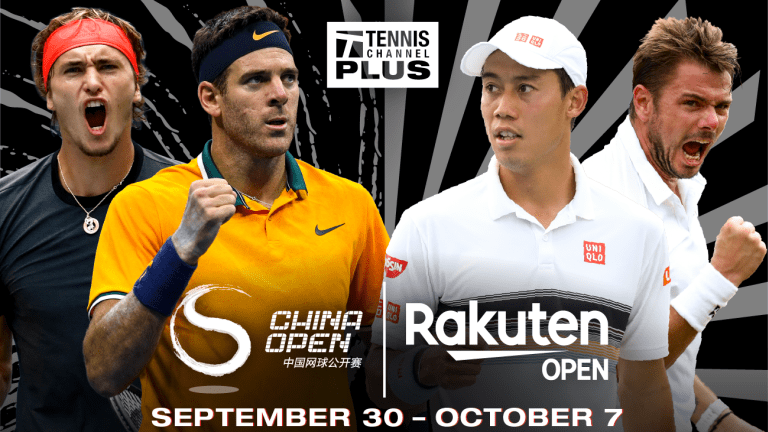
American Reilly Opelka stands tall going into the 2019 season
ATP Beijing & Tokyo (Sep. 30-Oct. 7)
- Tennis Channel PLUS has every ATP match live, from the first round to the final. Watch up to three courts from Beijing and two from Tokyo.